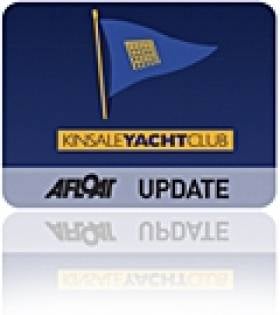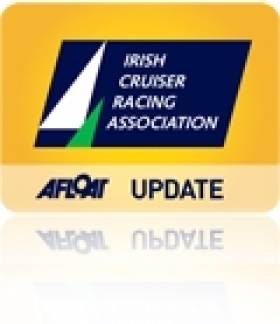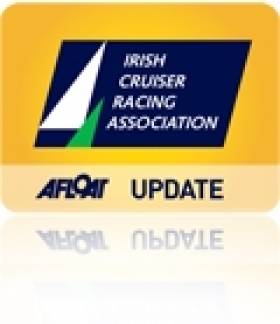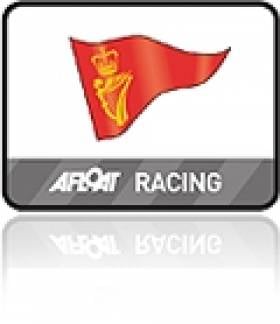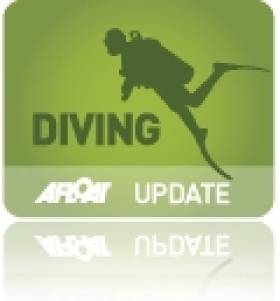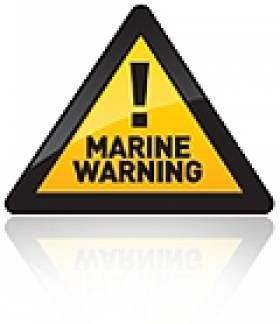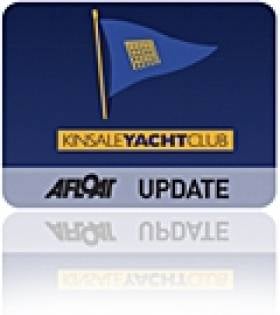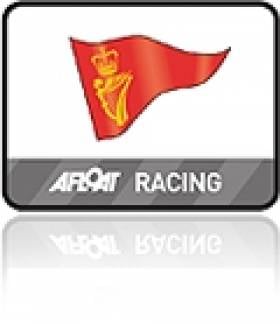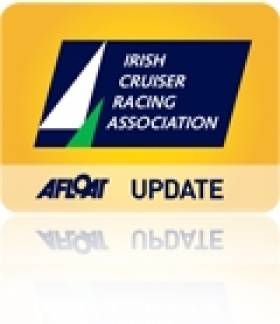Displaying items by tag: Cork Harbour
Quarter Ton Class Returns to Sovereigns Cup
The Quarter ton fleet is sailing back to the Sovereigns Cup in 2011. The event runs in Kinsale from June 22-25th.
The Quarter ton fleet made its debut at the 2009 event where a total of seventeen boats competed for the 'Keane's Jewellers perpetual Quarter Ton trophy'. Boats travelled from all over Ireland for the event with seven boats making the journey from the UK.
The four-day regatta was sailed on windward leeward courses, with one coastal race along the beautiful West Cork coastline. The coastal race proved memorable as the fleet short tacked their way along the shore to gain tidal relief in twenty knots of breeze and blazing sunshine with the race culminating in a long planning run back towards the mouth of the harbour.
After eight races the Cowes based yachtsman Peter Morton on 'Anchor Challenge' won the event on count back from Rob Gray's beautifully presented 'Aquilla' which was testimony to the close racing experienced within the fleet. The Ron Holland prize for best production boat was awarded to Kinsales' Ian Travers on his Bolero 'Bandit'.
The inclusion of the class in the 2009 regatta developed a lot of interest both during and after the event. Since then the Irish Quarter ton fleet has developed with the addition of some new boats with others currently undergoing refit for next season. With the recent announcement by the Quarter ton class in the UK to yet again include this event on their calendar for next year, it is highly likely that even in these recessionary times, the class numbers will grow for this truly enjoyable event. (See www.quartertonclass.org )
If you are interested in bringing your quarter tonner to Sovereigns Cup 2011 please contact Ian Travers @ +35387 9481576 or [email protected] or see HERE for further details.
New Trailerable 30 Footer to be Unveiled at ICRA Conference
Commodore Barry Rose is urging Cruiser Racers fans to support this weekend's eighth annual ICRA conference at the Carrigaline Court hotel in Carragaline, County Cork.
There's a big line up for the one day event that includes a presentation on an innovative concept to develop a 30 Footer one design concept that can also sail under IRC handicap. The idea is that it will be trailerable to attend ICRA Nationals and other events around Ireland. Rory Staunton travels from the UK to make the 30 footer presentation.
Rose says Saturday's event gives an opportunity to exchange 'constructive opinions to promote and develop the cruiser/racing', the biggest sector of Irish Sailing.
The event includes a celebration dinner for the Commodores Cup team at the Royal Cork Yacht Club.
Designers John Corby and Mark Mills will be present to update us on IRC developments and boat design and their thoughts on where boat design is heading. More HERE
29 Compete in CH Marine Winter League
A very good fleet of 29 cruisers came to the line for the first day of the CH Marine Winter league writes Claire Bateman. The first radio sound to be heard was the familiar voice of Afloat correspondent Tom MacSweeney, who was PRO for the occasion, advising the course to be sailed would 99, sailing Classes One and Two together and Classes 3 and White Sail also together. An equally well known voice came back wondering whether there would be water at one particular mark!!
The sea was flat and there was a fitful wintery sun. In spite of the dire forecast that had been promised, one could have been doing a lot worse than enjoying a race in Cork Harbour.
The course turned out to be a good choice as it is divided into three parts and could be shortened after any one of the three rounds. The wind from the ESB stack at Whitegate was showing north west, Met Eireann report from Roches Point was giving 5 knots from the west and the Race Officer for the Laser fleet was setting a course for a south west wind. It was that kind of day.
It was an off wind start and True Penance with Joe English on spinnaker got the best start with End Game just behind with Jimmy Nyhan trimming the spinnaker, and Bad Company was looking good as well on the shore side. Magnet was throwing all sorts of shapes at the cage but a was bit slow hoisting her spinnaker.
Classes Three and White Sail sailed one round of the course and Classes One and Two got in two rounds. This worked out very well because as the race progressed the tide was getting stronger and this helped the boats to make it out the harbour against the tide so it all jelled very well.
The prize giving followed at which CH Marine presented the competitors with very seasonal and acceptable bottles of wine and boxes of Cadburys Roses and immediately afterwards the threatened rain began to pour down but as this stage the competitors were not bothered as they were ready to go home having enjoyed a great day of racing.
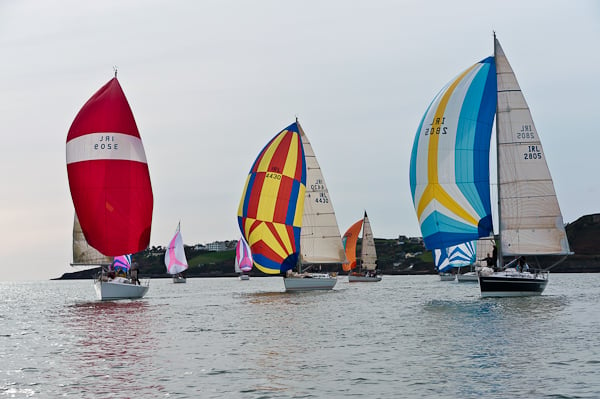
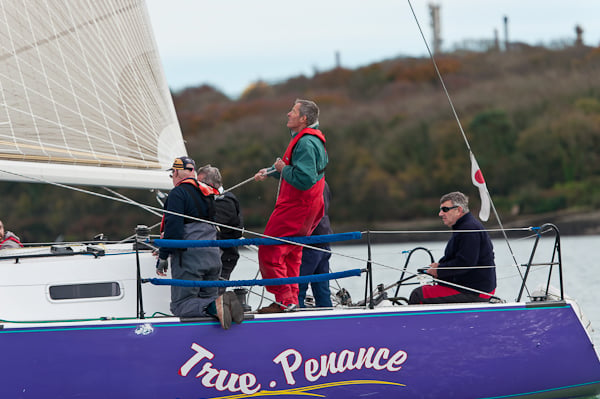
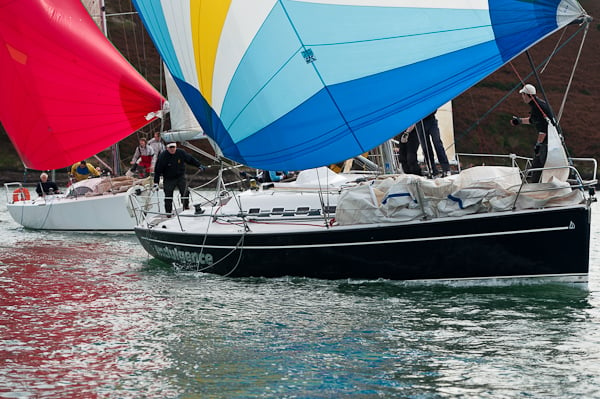
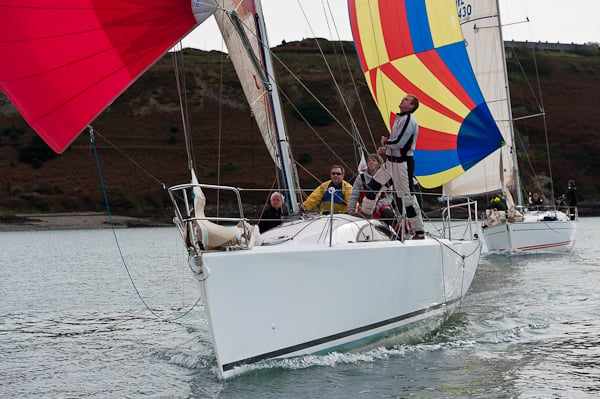
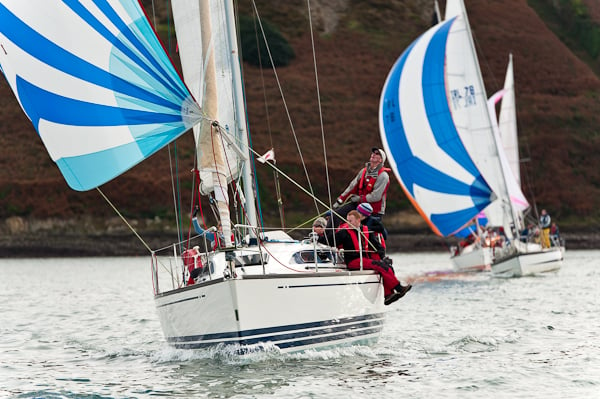
Photos by Bob Bateman
Historic Lecture on the Easter Rising Vessel, The Aud
Embedded in the history of Ireland, the events which occurred in April 1916 place Roger Casement and his famous gun running ship in the annals of Irish history. She lies broken, in a depth 34 metres in Cork Harbour. Much of the cargo of 20,000 guns and 1,000,000 rounds ammunitions still remain writes Timmy Carey. The ship was scuttled by her captain Karl Spindler rather than hand the cargo to the British. This would be the only German naval surface ship to enter Irish waters during World War 1. The wreck was depth charged on a number of occasions to make sure that the weapons were scattered and made unrecoverable by rebel forces and to prevent submarines using the wreck as cover. The rifles and much of the ammunition originated in Russia. They were captured as a result of the rout of Russian forces at the battle of Tannenburg in 1914.
This coming Friday night Blackwater Sub Aqua Club in Fermoy will host a lecture on the Aud by author Xander Clayton. Xander is a researcher of Modern Irish history and is the leading authority on the Casement Ship. He has made a detailed study of the ship and her 22 man crew over the past quarter century, culminating with the publication of the book "AUD" in 2007. He now lives in Ireland and the second edition of his book is due for imminent publication. The lecture will start at 20:00 and is free of charge. The venue is Blackwater Sub Aqua Clubhouse, Rathealy Road, Fermoy. For further information contact Matthew Culotty 087-8217069.

Xander Clayton author of the book "Aud"
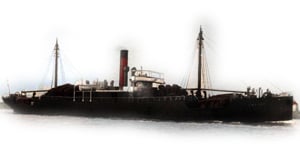
An image of the Aud ship before she was scuttled at the entrance to Cork harbour where she lies today
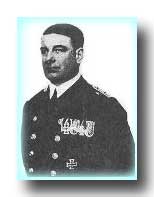
Karl Spindler the German captain of the Aud
Coastal Areas Braced for Flood Risk Tonight
A combination of high tides, high winds and low pressure increase the possibility of coastal flooding, particularly at high tide around midnight on Sunday 7 November and midday on Monday 8 November.
A deep low pressure centre is expected to move down across Ireland tonight, clearing away slowly during Monday. This weather system has the potential to bring some severe weather to Ireland. Rainfall totals are likely to reach 25mm - 30mm in places during Sunday and Monday. While not excessive, this rain may lead to some localised flooding on roads. The strongest winds associated with this weather system are likely to be well to the west of Ireland; however if the track of the low pressure is further east than currently expected, then these very strong winds may possibly affect our west coast.
The principal dangers from this weather system will be due to very high seas off the southwest and west coast (waves approaching 9m) and coastal flooding due to a combination of high tides, very low pressure, storm surge and onshore winds. The danger period extends through Sunday night and, for the east coast, much of Monday also. Valid from: 12hrs Sunday Nov 7th To: 06hrs Tuesday Nov 9th.
Householders, property owners, motorists and pedestrians are warned that there is a risk of coastal flooding in Dublin in the next 36 hours according to a Dublin city council update issued last night.
More from Cork City Council HERE
More from Dublin City Council HERE
On the Forum: Dry Sailing at Royal Cork
A dry sailing facility would make the Royal Cork Yacht Club one of the best in the world. It's a pity it may be too expensive, says Patton. It is a pity too about the lack of highly competitive racing in a club full to the brim with seriously talented sailors, he says. Read more HERE
Panz is looking for help identifying a location of a sailing venue. A photo shows a National 18 on the hard at a clubhouse that might be in Derry? Can you help identify this club house? HERE
Kinsale Yacht Club Announces 2011 Sovereign's Cup
Details of the 2011 Sovereign's Cup were announced at a reception at Kinsale Yacht Club, hosted by Regatta Director, Gary Horgan. The Sovereign's Cup takes place from 22nd-25th June 2011 in the outer harbour of Kinsale which prides itself with excellent sailing conditions, as well as an extensive social programme ashore.
The Sovereign's Cup was established in 1995 as a biennial event and has been a very successful and hugely popular cruiser regatta, with over 140 boats from all over Ireland and the UK competing for the prestigious Sovereign's Cup for best all round score in IRC and The Portcullis Trophy for best progressive handicap.
There are many Classes for entry; including Class 0, 1, 2, 3, 4 and two White Sails classes. Also, the Quarter Ton Class Championships will be taking place during the Sovereign's Cup, bringing many new visitors to Kinsale from the South of England and Wales in particular.
Eamonn Rohan in Blondie IV a Mills Design King 40, claimed the 2009 Sovereign's Cup as the 2009 Portcullis Trophy was awarded to Chapman / Reilly's Crazy Horse. Anchor Challenge captured Class 3-IRC and the Quarter Ton Class and was awarded the Keane's Jewellers Quarter Ton Perpetual Trophy.
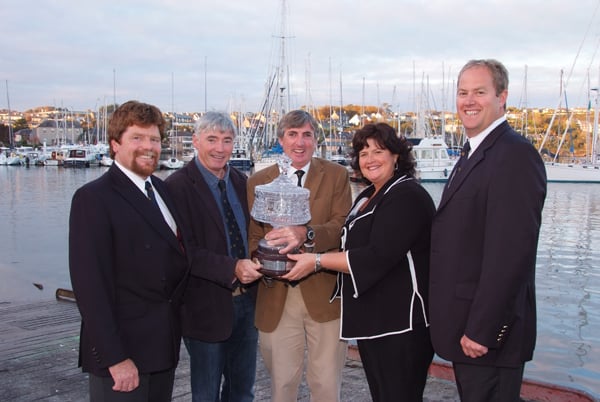
The Kinsale Yacht Club committee behind the 2011 Sovereigns Cup
"We have already received a number of entries for The 2011 Sovereign's Cup in June and we will be stepping up our sponsorship and communications programme as the months advance," said Gary Horgan, Race Director. "We are very grateful to Kinsale Yacht Club, the Race Management team and all the volunteers who get involved with the organisation of the Sovereign's Cup as we are working hard to organise an excellent programme both on and off the water. We are encouraging people to start thinking about their travel and accommodation plans and are delighted that the Cork Swansea ferry will enable more sailors to access Kinsale easily from the UK," he added.
Weather Gods at Play for October League Finale
Arriving at the Royal Cork Yacht Club yesterday for the final day of the O'Flynn Exhams Autumn League there wasn't a puff of wind to be felt writes Claire Bateman. The Club Burgee hung limply and the general consensus of competitors on the marina was that there wouldn't be any wind. However, lo and behold as the boats went out into the harbour wind was blowing from the south and spirits (not the Halloween Spooks) lifted immediately. PHOTO GALLERY HERE.
Race Officer David O'Brien in Admiral Paddy McGlade's Sabrone anchored off Whitegate and set a course a course for the Red Fleet out to the mouth of the harbour starting Class Two first and this was great as they were followed by the 1720s and in turn by the higher rated boats of Classes Zero and 1. This made for a great intermingling of the fleets in the harbour. Starting just after the top of the tide and with a southerly breeze this was a help to the boats on the beat as they tacked to and frow some favouring the western shore but the majority favouring the eastern shore. Conditions got a bit lumpy with the wind over tide and steeped up by a ground swell. There were a couple of showers but considering the summer like conditions that had been enjoyed for the series nobody was going to bother about this. After each shower cleared there was the most amazing light on the fleets and rainbows added more punch to the colour of the spinnakers.
In race 2 there was an incident on the line in Class 1 when there was a coming together of Mary O'Keeffe's Tux and Wan and Eric Waterman's Saxon Senator resulting in Senator's retiral. Also in the Red Fleet there were six boats disqualified for sailing the wrong way through the finish line – perhaps more reading of the Sailing Instructions required!!
Race Officer Richard Leonard in Pascal Healy's Capta Ventum anchored off Cuskinny to sail the Green Fleet on the laid courses. Richard, perfectionist that he is, complained bitterly that the wind had shifted some 20 degrees after the start and when sailing multi fleets particularly on a short course it would be extremely difficult to shift the marks. Nevertheless he got in two good races.
In Class 3 there was very keen competition between Ian Travers in Bandit and the Kenefick O'Brien favourite Tiger and they shared a first and second each on the day. However, Tiger triumphed overall by a winning margin of 2 points after 10 races. Newcomer to racing Fergus Coughlan in Whyte Knight had two wins on the day in Class 3 ECHO ensuring his overall andpopular win in this class.
IN Class 4 ECHO Michael Murphy in Shelly D created his own bit of sailing history when sailed his boat to victory in this class. He had sailed Shelly D in the October League for 31 consecutive years and received a a tremendous ovation for his efforts. However, in Class 4 IRC there was no stopping Alan Mulcahy in Sundancer from taking the overall prize with 7 wins and 2 seconds.
In White Sail 1 IRC Tom and Conor McNeice in Minx 111 had two thirds yesterday and this was enough to give them the overall win in the class. The Carroll Bros. In Chancer had two wins yesterday but ended up seond overall.
In White Sail 2 IRC Clive Doherty's Phaeton made a late challenge winning both races and this was enough for overall victory over Roy Hanan's Plumbat.
The prizegiving took place in a packed dining room after a very enjoyable meal. The prizes were magnificent, and were presented by Richard Neville, Managing Partner from the excellent sponsor O'Flynn Exhams Solicitors, aided by Admiral Paddy McGlade and Regatta Director, Rear Admiral Ronan Enright. Irene O'Donovan also a partner from the sponsor company, was present with her husband Pascal Healy who had provided the committee boat for the laid course and who were both on board for the series.
A most successful series was enjoyed by all and sundry and not forgotten in the acknowledgements were the club volunteers who had given freely of their time and effort to make the event the memorable Autumn League that it was.
Marinerscove Takes Narrow Lead in 'Boat of the Year' Opinion Poll
Marinerscove leads Afloat's sailing Boat of the Year opinion poll that has attracted over 1700 votes to date. After 20 days of voting the lead has changed several times in the fun poll and early leader Erisslanan, who shared boat of the week with Mariners at Cork week is now in third place on 227 votes, some distance behind ISORA winner Raging bull on 607 votes. 81 votes clear ahead is the Crosshaven boat that also bagged the British IRC title this year. Dave Dwyer's Marinerscove was of course also the middle boat in the victorious Irish Commodores Cup team in August. The ICRA boat of the year award will be awarded on November 13th at the Cruiser Racer conference in Carrigaline. You can vote by using the poll on the left hand side of Afloat's home page.



























